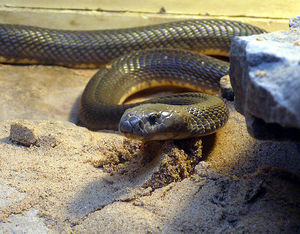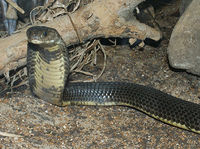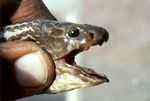Central Asian cobra: Difference between revisions
imported>Francis Zaia |
mNo edit summary |
||
| (11 intermediate revisions by 2 users not shown) | |||
| Line 21: | Line 21: | ||
| binomial_authority = (Eichwald, 1831)<ref>[http://www.itis.gov/servlet/SingleRpt/SingleRpt?search_topic=TSN&search_value=700635 Naja atra (TSN 700635)] at [http://www.itis.gov/index.html Integrated Taxonomic Information System]. Accessed 15 May 2012.</ref><ref>[http://reptile-database.reptarium.cz/species?genus=Naja&species=oxiana Naja oxiana (EICHWALD, 1831)] at [http://www.reptile-database.org/ The Reptile Database]. Accessed 15 May 2012.</ref> | | binomial_authority = (Eichwald, 1831)<ref>[http://www.itis.gov/servlet/SingleRpt/SingleRpt?search_topic=TSN&search_value=700635 Naja atra (TSN 700635)] at [http://www.itis.gov/index.html Integrated Taxonomic Information System]. Accessed 15 May 2012.</ref><ref>[http://reptile-database.reptarium.cz/species?genus=Naja&species=oxiana Naja oxiana (EICHWALD, 1831)] at [http://www.reptile-database.org/ The Reptile Database]. Accessed 15 May 2012.</ref> | ||
| range_map = Central Asian cobra distribution.jpg | | range_map = Central Asian cobra distribution.jpg | ||
| range_map_caption = Distribution of the Central Asian cobra | | range_map_caption = Distribution of the Central Asian cobra | ||
| synonyms = | | synonyms = | ||
*''Tomyris oxiana'' <br/><small>Eichwald, 1831</small> | *''Tomyris oxiana'' <br/><small>Eichwald, 1831</small> | ||
| Line 34: | Line 34: | ||
}} | }} | ||
The '''Central Asian cobra''' (''Naja oxiana''), also commonly known as the '''Caspian cobra''' and '''Oxus cobra''', is a highly venomous species of cobra found in central Asia and belongs to the [[Elapidae]] family. It occurs in central Asia and like other cobra species, it spreads a “hood” as a warning potential predators and other threats. The species is protected in | The '''Central Asian cobra''' (''Naja oxiana''), also commonly known as the '''Caspian cobra''' and '''Oxus cobra''', is a highly venomous species of cobra found in central Asia and belongs to the [[Elapidae]] family. It occurs in central Asia and like other cobra species, it spreads a “hood” as a warning to potential predators and other threats. The species is protected in Tajikistan, Turkmenistan and Uzbekistan. | ||
==Etymology== | ==Etymology== | ||
| Line 40: | Line 40: | ||
==Description== | ==Description== | ||
{{Image|Naja oxiana (3).jpg|left|300px|Head and body of a Central Asian cobra.}} | |||
This species is medium in length, heavy bodied snake with long cervical ribs capable of expansion to form a hood when threatened. The body is compressed dorsoventrally and subcylindrical posteriorly. The head is elliptical, depressed, slightly distinct from the neck with a short, rounded snout and large nostrils. The eyes are medium in size with round pupils. [[Dorsal scales]] are smooth and strongly oblique with the outer 2 or 3 scale rows larger than remainder.<ref name=ct>[http://www.toxinology.com/fusebox.cfm?fuseaction=main.snakes.display&id=SN0042 Central Asian cobra: General Details] at [http://www.toxinology.com/ Clinical Toxinology]. Accessed 17 May 2012.</ref> Adult specimens average between {{convert|1.1|m|ft}} and {{convert|1.4|m|ft}} in length. Specimens longer than {{convert|1.5|m|ft}} are rare. This species exhibits considerable ontogenetic variation in its pattern. Juveniles are strongly banded, dorsally and ventrally. Anteriorly, the dark and light bands are approximately 3-5 ventrals wide, of equal width, and completely encircle the body. Going back along the body, the bands become narrower, and less clear on the ventral side. The ventral banding disappears altogether in the posterior third of the body. Going back, the dorsal light bands split into double bands, which then split into quadruple bands, and so on. The total number of light bands is around 45. Despite the presence of very obvious bands, the general appearance of the young specimens is very faded. The banding fades slowly with increasing size, but is still faintly visible, at least in the anterior part of the body, in young adults up to {{convert|90|cm|ft}} and {{convert|100|cm|ft}}.<ref name=ww98>Wüster, Wolfgang (1998). ''The Cobras of the genus Naja in India.'' Hamadryad '''23''' (1): 15-32</ref> | This species is medium in length, heavy bodied snake with long cervical ribs capable of expansion to form a hood when threatened. The body is compressed dorsoventrally and subcylindrical posteriorly. The head is elliptical, depressed, slightly distinct from the neck with a short, rounded snout and large nostrils. The eyes are medium in size with round pupils. [[Dorsal scales]] are smooth and strongly oblique with the outer 2 or 3 scale rows larger than remainder.<ref name=ct>[http://www.toxinology.com/fusebox.cfm?fuseaction=main.snakes.display&id=SN0042 Central Asian cobra: General Details] at [http://www.toxinology.com/ Clinical Toxinology]. Accessed 17 May 2012.</ref> Adult specimens average between {{convert|1.1|m|ft}} and {{convert|1.4|m|ft}} in length. Specimens longer than {{convert|1.5|m|ft}} are rare. This species exhibits considerable ontogenetic variation in its pattern. Juveniles are strongly banded, dorsally and ventrally. Anteriorly, the dark and light bands are approximately 3-5 ventrals wide, of equal width, and completely encircle the body. Going back along the body, the bands become narrower, and less clear on the ventral side. The ventral banding disappears altogether in the posterior third of the body. Going back, the dorsal light bands split into double bands, which then split into quadruple bands, and so on. The total number of light bands is around 45. Despite the presence of very obvious bands, the general appearance of the young specimens is very faded. The banding fades slowly with increasing size, but is still faintly visible, at least in the anterior part of the body, in young adults up to {{convert|90|cm|ft}} and {{convert|100|cm|ft}}.<ref name=ww98>Wüster, Wolfgang (1998). ''The Cobras of the genus Naja in India.'' Hamadryad '''23''' (1): 15-32</ref> | ||
| Line 47: | Line 48: | ||
Naja oxiana differs from all other Asiatic cobras by its very high ventral and subcaudal scale counts. Only ''Naja naja'' ([[Indian cobra]]), and, very occassionally, the [[Monocled cobra]] (''Naja kaouthia''), may overlap in both [[Ventral scales|ventral]] and [[Subcaudal scales|subcaudal scale]] counts. Specimens from the former Soviet Central Asia and Iran do not generally have any cuneate scales, whereas specimens from east of the Hindukush Mountains generally have one on each side.<ref name=ww98/> <ref>Minton, SA. (1966). ''A contribution to the herpetology of West Pakistan.'' Bull. American Mus. nat. Hist. 134: 27-184.</ref> | Naja oxiana differs from all other Asiatic cobras by its very high ventral and subcaudal scale counts. Only ''Naja naja'' ([[Indian cobra]]), and, very occassionally, the [[Monocled cobra]] (''Naja kaouthia''), may overlap in both [[Ventral scales|ventral]] and [[Subcaudal scales|subcaudal scale]] counts. Specimens from the former Soviet Central Asia and Iran do not generally have any cuneate scales, whereas specimens from east of the Hindukush Mountains generally have one on each side.<ref name=ww98/> <ref>Minton, SA. (1966). ''A contribution to the herpetology of West Pakistan.'' Bull. American Mus. nat. Hist. 134: 27-184.</ref> | ||
23-27 (usually 25) scale rows around hood, 19-23 (usually 21) just ahead of midbody; 191-210 ventrals, 57-71 paired subcaudals; cuneates often absent.<ref>[http://pages.bangor.ac.uk/~bss166/Taxa/AsNaja.htm Asiatic Naja] at [http://www.bangor.ac.uk/ Bangor University]. Accessed 17 May 2012.</ref> | 23-27 (usually 25) scale rows around hood, 19-23 (usually 21) just ahead of midbody; 191-210 [[ventrals]], 57-71 paired [[subcaudals]]; cuneates often absent.<ref>[http://pages.bangor.ac.uk/~bss166/Taxa/AsNaja.htm Asiatic Naja] at [http://www.bangor.ac.uk/ Bangor University]. Accessed 17 May 2012.</ref> | ||
===Taxonomic note=== | ===Taxonomic note=== | ||
| Line 54: | Line 55: | ||
==Distribution and habitat== | ==Distribution and habitat== | ||
===Geographical distribution=== | ===Geographical distribution=== | ||
This species is well known in the Transcaspian region from | This species is well known in the Transcaspian region from Turkmenistan, Uzbekistan, Tajikistan, northeastern Iran, southeastern and northern Afghanistan, and northern Pakistan (North-West Frontier province and northern Baluchistan).<ref name=ct/> There are more recent records from several parts of the Pakistani Punjab.<ref name=khan77>Khan, MS. (1977). ''Checklist and key to the snakes of Jhang District, Punjab, Pakistan. Biologia (Lahore) '''23:''' 145-157.</ref> In India, specimens have been reported from the Punch Valley, northwest of Jammu, and Mahajan and Agrawal (1976) described a specimen from the Simla Hills, in Himachal Pradesh.<ref>Mahajanm, KK. Agrawal, HP. (1976). Report on a collection of reptile fauna from Simla Hills, Himachal Pradesh. ''Rec. Zool. Surv. India'' '''71:''' 301-312</ref> Reports from Rajahstan and Gujarat and other parts of northwestern India are probably based on specimens of ''Naja naja'' (Indian cobra) which lacked a hood mark. The range of the Central Asian cobra is split into two parts by the Hindukush mountains and the deserts of southern Afghanistan, southeastern Iran and southwestern Pakistan.<ref>Joger, U. (1984). The venomous snakes of the Near Middle East. Beihefte zyn Tubinger Atlas des Vorderen Orients, A 12. Dr. Ludwig Reichert Verlag, Wiesbaden. 115 pp.</ref> | ||
===Habitat=== | ===Habitat=== | ||
| Line 73: | Line 74: | ||
This species is classified as Data Deficient (DD) on the IUCN Red List of Threatened Species (v3.1, 2011). The conservation status of this species was last assessed in 2010.<ref name=iucn/> | This species is classified as Data Deficient (DD) on the IUCN Red List of Threatened Species (v3.1, 2011). The conservation status of this species was last assessed in 2010.<ref name=iucn/> | ||
This species is protected in all wildlife reserves in | This species is protected in all wildlife reserves in Tajikistan, Turkmenistan and Uzbekistan. However, the main threat to the Central Asian cobra as a species comes from humans. The construction of new housing, cutting wood for firewood, and deforestation to create pastureland, causes the destruction of habitat for these cobras and their prey and increases the likelihood of confrontation with humans, as the cobras seek food in human-populated areas. Excessive irrigation for [[Agriculture|agricultural]] purposes has led to the loss of much of the Tugai ecosystem as it is transformed into desert. The overgrazing of cattle leads to a reduction of food sources for the species' prey as well. These trends, along with over-hunting and indiscriminate killing by humans, have led to a reduction of the Central Asian cobra population.<ref>Krever, V., O. Pereladova, M. Williams, and H. Jungius. (1998). ''[http://www.wwf.ru/resources/publ/book/eng/36 Biodiversity conservation in central Asia: An analysis of biodiversity and current threats and initial investment portfolios.]'' World Wild Fund for Nature (WWF), Washington DC.</ref><ref>Sokolov, V.Y., and Y.Y. Syroechkovskii. (1990). Reserves of Central Asia and Kazakhstan. Mysl’, Moscow, USSR.</ref> | ||
==Reproduction== | ==Reproduction== | ||
| Line 80: | Line 81: | ||
==Venom== | ==Venom== | ||
{{Image|Naja oxiana (8).jpg|left|150px|Central Asian cobra being prepped to have its venom milked.}} | {{Image|Naja oxiana (8).jpg|left|150px|Central Asian cobra being prepped to have its venom milked.}} | ||
The venom is primarily a potent [[neurotoxin]],<ref name=DoD/> but it also has some [[cytotoxin|cytotoxic]] activity (tissue-death; necrosis).<ref name=cytotoxins>{{cite journal |title=Cancer cell injury by cytotoxins from cobra venom is mediated through lysosomal damage |year=2005 |last1=Sharonov |first1=George V. |last2=Feofanov |first2=Alexei V. |last3=Astapova |first3=Maria V. |last4=Rodionov |first4=Dmitriy I. |last5=Utkin |first5=Yuriy N. |last6=Arseniev |first6=Alexander S. |journal=Biochemical Journal |volume=390 |pages=11–8 |pmid=15847607 |issue=Pt 1 |pmc=1184559}}</ref> Two forms of "cytotoxin II" ([[cardiotoxin]]) were found in the venom of this species.<ref name=CTII>{{cite journal |title=Two forms of cytotoxin II (cardiotoxin) from Naja naja oxiana in aqueous solution. Spatial structures with tightly bound water molecules |year=1999 |last1=Dementieva |first1=Daria V. |last2=Bocharov |first2=Eduard V. |last3=Arseniev |first3=Alexander. S. |journal=European Journal of Biochemistry |volume=263 |pages=152–62 |pmid=10429199 |issue=1}}</ref> The subcutaneous LD<sub>50</sub> value is 0.4 mg/kg, making it one of the most venomous of the ''[[Naja]]'' (cobra) species.<ref name=Brown>{{cite book |last=Brown |first=John H. |title=Toxicology and Pharmacology of Venoms from Poisonous Snakes |year=1973 |publisher=Charles C. Thomas Publishers |location=Springfield, IL USA |isbn=0-398-02808-7|page=82}}</ref> Average venom yield per bite for this species is between 75-125 mg (dry weight),<ref name=ct/> but it may yield up to 300 mg (dry weight).<ref name=Brown/> The bite of this species may cause severe pain and swelling, along with severe neurotoxicity. Weakness, drowsiness, ataxia, hypotension, and paralysis of throat and limbs may appear in less than one hour after the bite. Without medical treatment, symptoms rapidly worsen and death can rapidly occur after a bite due to respiratory failure.<ref name=DoD/> | The venom is primarily a potent [[neurotoxin]],<ref name=DoD/> but it also has some [[cytotoxin|cytotoxic]] activity (tissue-death; necrosis).<ref name=cytotoxins>{{cite journal |title=Cancer cell injury by cytotoxins from cobra venom is mediated through lysosomal damage |year=2005 |last1=Sharonov |first1=George V. |last2=Feofanov |first2=Alexei V. |last3=Astapova |first3=Maria V. |last4=Rodionov |first4=Dmitriy I. |last5=Utkin |first5=Yuriy N. |last6=Arseniev |first6=Alexander S. |journal=Biochemical Journal |volume=390 |pages=11–8 |pmid=15847607 |issue=Pt 1 |pmc=1184559}}</ref> Two forms of "cytotoxin II" ([[Cardiotoxicity|cardiotoxin]]) were found in the venom of this species.<ref name=CTII>{{cite journal |title=Two forms of cytotoxin II (cardiotoxin) from Naja naja oxiana in aqueous solution. Spatial structures with tightly bound water molecules |year=1999 |last1=Dementieva |first1=Daria V. |last2=Bocharov |first2=Eduard V. |last3=Arseniev |first3=Alexander. S. |journal=European Journal of Biochemistry |volume=263 |pages=152–62 |pmid=10429199 |issue=1}}</ref> The subcutaneous LD<sub>50</sub> value is 0.4 mg/kg, making it one of the most venomous of the ''[[Naja]]'' (cobra) species.<ref name=Brown>{{cite book |last=Brown |first=John H. |title=Toxicology and Pharmacology of Venoms from Poisonous Snakes |year=1973 |publisher=Charles C. Thomas Publishers |location=Springfield, IL USA |isbn=0-398-02808-7|page=82}}</ref> Average venom yield per bite for this species is between 75-125 mg (dry weight),<ref name=ct/> but it may yield up to 300 mg (dry weight).<ref name=Brown/> The bite of this species may cause severe pain and swelling, along with severe neurotoxicity. Weakness, drowsiness, ataxia, hypotension, and paralysis of throat and limbs may appear in less than one hour after the bite. Without medical treatment, symptoms rapidly worsen and death can rapidly occur after a bite due to respiratory failure.<ref name=DoD/> | ||
==Cited references== | ==Cited references== | ||
<div class="references-small"> | <div class="references-small"> | ||
<references/> | <references/> | ||
</div> | </div>[[Category:Suggestion Bot Tag]] | ||
Latest revision as of 11:00, 26 July 2024
| Central Asian cobra | ||||||||||||||||||||
|---|---|---|---|---|---|---|---|---|---|---|---|---|---|---|---|---|---|---|---|---|
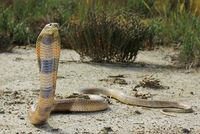 Central Asian cobra
| ||||||||||||||||||||
| Conservation status | ||||||||||||||||||||
|
Data Deficient[1]
| ||||||||||||||||||||
| Scientific classification | ||||||||||||||||||||
| ||||||||||||||||||||
| Binomial name | ||||||||||||||||||||
| Naja oxiana (Eichwald, 1831)[2][3] | ||||||||||||||||||||
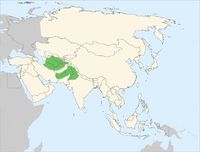 Distribution of the Central Asian cobra
| ||||||||||||||||||||
| Synonyms | ||||||||||||||||||||
|
The Central Asian cobra (Naja oxiana), also commonly known as the Caspian cobra and Oxus cobra, is a highly venomous species of cobra found in central Asia and belongs to the Elapidae family. It occurs in central Asia and like other cobra species, it spreads a “hood” as a warning to potential predators and other threats. The species is protected in Tajikistan, Turkmenistan and Uzbekistan.
Etymology
The Central Asian cobra was described by Russian geologist and physician Karl Eichwald in 1831.[4] The generic name naja is a Latinisation of the Sanskrit word nāgá (नाग) meaning "cobra". The specific epithet oxiana refers to the region surrounding the Amu Darya River which flows along Afghanistan's northern border separating it from Tajikistan and Uzbekistan before turning northwest into Turkmenistan to the Aral Sea. In ancient times, the river was known as the Oxus in Greek.[5]
Description
This species is medium in length, heavy bodied snake with long cervical ribs capable of expansion to form a hood when threatened. The body is compressed dorsoventrally and subcylindrical posteriorly. The head is elliptical, depressed, slightly distinct from the neck with a short, rounded snout and large nostrils. The eyes are medium in size with round pupils. Dorsal scales are smooth and strongly oblique with the outer 2 or 3 scale rows larger than remainder.[6] Adult specimens average between 1.1 m (3.61 ft) and 1.4 m (4.59 ft) in length. Specimens longer than 1.5 m (4.92 ft) are rare. This species exhibits considerable ontogenetic variation in its pattern. Juveniles are strongly banded, dorsally and ventrally. Anteriorly, the dark and light bands are approximately 3-5 ventrals wide, of equal width, and completely encircle the body. Going back along the body, the bands become narrower, and less clear on the ventral side. The ventral banding disappears altogether in the posterior third of the body. Going back, the dorsal light bands split into double bands, which then split into quadruple bands, and so on. The total number of light bands is around 45. Despite the presence of very obvious bands, the general appearance of the young specimens is very faded. The banding fades slowly with increasing size, but is still faintly visible, at least in the anterior part of the body, in young adults up to 90 cm (2.95 ft) and 100 cm (3.28 ft).[7]
The dorsum of large adult specimens is more or less uniform, and of various shades of brown, but not normally black. The scales often have lighter edges than centres. The ventral surface is much lighter, often being cream coloured, with some mottling. The first 2-6 dark bands found on juveniles usually persist into adulthood. The first two are usually distinct, the more posterior ones less so. The first of these bands occupies a more anterior position than other Asiatic cobras. There are no lateral blotches on the throat. The pattern of the Central Asian cobra is not very variable. This species has no distinct hood mark. The banding seen on the dorsum continues onto the neck.[7]
Scalation
Naja oxiana differs from all other Asiatic cobras by its very high ventral and subcaudal scale counts. Only Naja naja (Indian cobra), and, very occassionally, the Monocled cobra (Naja kaouthia), may overlap in both ventral and subcaudal scale counts. Specimens from the former Soviet Central Asia and Iran do not generally have any cuneate scales, whereas specimens from east of the Hindukush Mountains generally have one on each side.[7] [8]
23-27 (usually 25) scale rows around hood, 19-23 (usually 21) just ahead of midbody; 191-210 ventrals, 57-71 paired subcaudals; cuneates often absent.[9]
Taxonomic note
Indian cobra (Naja naja) specimens without a hood mark are usually confused with this species, where these two co-exist in Pakistan and northwestern India. The Central Asian cobra is never fully black, although some specimens may be quite dark. Another thing is that this species of cobra normally has several dark bands under the throat, whereas in the black phase of Indian cobras (N. naja) from Pakistan, almost the entire throat is black.[10]
Distribution and habitat
Geographical distribution
This species is well known in the Transcaspian region from Turkmenistan, Uzbekistan, Tajikistan, northeastern Iran, southeastern and northern Afghanistan, and northern Pakistan (North-West Frontier province and northern Baluchistan).[6] There are more recent records from several parts of the Pakistani Punjab.[11] In India, specimens have been reported from the Punch Valley, northwest of Jammu, and Mahajan and Agrawal (1976) described a specimen from the Simla Hills, in Himachal Pradesh.[12] Reports from Rajahstan and Gujarat and other parts of northwestern India are probably based on specimens of Naja naja (Indian cobra) which lacked a hood mark. The range of the Central Asian cobra is split into two parts by the Hindukush mountains and the deserts of southern Afghanistan, southeastern Iran and southwestern Pakistan.[13]
Habitat
This species is often found in arid and semi-arid, rocky or stony, shrub or scrub covered foothills[6] at elevations up to about 3000 m (9842.52 ft) in Baluchistan. This is also the westernmost species of Asiatic cobra.[14] It favours drier areas than the Indian cobra or the Monocled cobra, being found mainly in arid and semi-arid areas, and in dry mountain situations. In Pakistan, it is reported to occur in drier areas than the sympatric Indian cobra.[11]
Behaviour, ecology and status
Behaviour and habits
The Central Asian cobra is quick-moving and agile species that lives in holes in embankments or trees.[14] It is mainly diurnal and terrestrial (tends to search for prey during late afternoon and early evening) but it can become crepuscular and nocturnal in some parts of its range during the hottest months of the year, especially in July. Good climbers and swimmers, they are particularly fond of water and are seldom found too far away from it. Although this species is generally intent on escape when encountered (juveniles tend to be more aggressive), they may become quite aggressive if cornered or provoked. In such a case it will spread its hood, hiss, sway from side to side and strike repeatedly. This species of cobra is a non-spitter.[6]
Diet
Juveniles tend to prey on amphibians and lizards. The primary food sources for adults are mammals, like gerbils, rats, mice and voles, but they will also take toads and frogs, and occasionally they'll take fish, birds and their eggs.[6][7]
Predators
In addition to being a predator, the Central Asian cobra is also prey. Different mongoose species, several varieties of birds of prey (especially "snake eagles"), and even other snakes may occasionally hunt and prey on this species. Juveniles or young specimens are particularly at risk of predation. Humans sometimes hunt the snake for their skins, for show as a subject for snake charmers or for staged fights with mongooses. This cobra is also hunted for use in local medicinal recipes.
Conservation status
This species is classified as Data Deficient (DD) on the IUCN Red List of Threatened Species (v3.1, 2011). The conservation status of this species was last assessed in 2010.[1]
This species is protected in all wildlife reserves in Tajikistan, Turkmenistan and Uzbekistan. However, the main threat to the Central Asian cobra as a species comes from humans. The construction of new housing, cutting wood for firewood, and deforestation to create pastureland, causes the destruction of habitat for these cobras and their prey and increases the likelihood of confrontation with humans, as the cobras seek food in human-populated areas. Excessive irrigation for agricultural purposes has led to the loss of much of the Tugai ecosystem as it is transformed into desert. The overgrazing of cattle leads to a reduction of food sources for the species' prey as well. These trends, along with over-hunting and indiscriminate killing by humans, have led to a reduction of the Central Asian cobra population.[15][16]
Reproduction
Not much is known about the reproduction of the Central Asian cobra. Like most other elapids, it is oviparous and generally lays between 6 and 19 eggs. Hatchlings are independent right from birth.[17]
Venom
The venom is primarily a potent neurotoxin,[14] but it also has some cytotoxic activity (tissue-death; necrosis).[18] Two forms of "cytotoxin II" (cardiotoxin) were found in the venom of this species.[19] The subcutaneous LD50 value is 0.4 mg/kg, making it one of the most venomous of the Naja (cobra) species.[20] Average venom yield per bite for this species is between 75-125 mg (dry weight),[6] but it may yield up to 300 mg (dry weight).[20] The bite of this species may cause severe pain and swelling, along with severe neurotoxicity. Weakness, drowsiness, ataxia, hypotension, and paralysis of throat and limbs may appear in less than one hour after the bite. Without medical treatment, symptoms rapidly worsen and death can rapidly occur after a bite due to respiratory failure.[14]
Cited references
- ↑ 1.0 1.1 Naja oxiana. The IUCN Red List of Threatened Species. IUCN Red List of Threatened Species. Retrieved on 15 May 2012.
- ↑ Naja atra (TSN 700635) at Integrated Taxonomic Information System. Accessed 15 May 2012.
- ↑ Naja oxiana (EICHWALD, 1831) at The Reptile Database. Accessed 15 May 2012.
- ↑ Eichwald, E. (1831). Zoologia specialis, quam expositis animalibus tum vivis, tum fossilibus potissimuni rossiae in universum, et poloniae in specie, in usum lectionum publicarum in Universitate Caesarea Vilnensi. Zawadski, Vilnae.
- ↑ Byron, Robert. (1982). The Road to Oxiana. Oxford University Press, USA. 292 pp. ISBN 0195030672
- ↑ 6.0 6.1 6.2 6.3 6.4 6.5 Central Asian cobra: General Details at Clinical Toxinology. Accessed 17 May 2012.
- ↑ 7.0 7.1 7.2 7.3 Wüster, Wolfgang (1998). The Cobras of the genus Naja in India. Hamadryad 23 (1): 15-32
- ↑ Minton, SA. (1966). A contribution to the herpetology of West Pakistan. Bull. American Mus. nat. Hist. 134: 27-184.
- ↑ Asiatic Naja at Bangor University. Accessed 17 May 2012.
- ↑ Venom Street (Naja oxiana). Venom Street Collector and Breeder of Asian Cobras. Venom Street. Retrieved on 17 May 2012.
- ↑ 11.0 11.1 Khan, MS. (1977). Checklist and key to the snakes of Jhang District, Punjab, Pakistan. Biologia (Lahore) 23: 145-157.
- ↑ Mahajanm, KK. Agrawal, HP. (1976). Report on a collection of reptile fauna from Simla Hills, Himachal Pradesh. Rec. Zool. Surv. India 71: 301-312
- ↑ Joger, U. (1984). The venomous snakes of the Near Middle East. Beihefte zyn Tubinger Atlas des Vorderen Orients, A 12. Dr. Ludwig Reichert Verlag, Wiesbaden. 115 pp.
- ↑ 14.0 14.1 14.2 14.3 Naja oxiana. Armed Forces Pest Management Board. United States Department of Defense. Retrieved on 17 May 2012.
- ↑ Krever, V., O. Pereladova, M. Williams, and H. Jungius. (1998). Biodiversity conservation in central Asia: An analysis of biodiversity and current threats and initial investment portfolios. World Wild Fund for Nature (WWF), Washington DC.
- ↑ Sokolov, V.Y., and Y.Y. Syroechkovskii. (1990). Reserves of Central Asia and Kazakhstan. Mysl’, Moscow, USSR.
- ↑ Oshea, Mark. (2005). Venomous Snakes of the World. UK: New Holland Publishers. 64 pp. ISBN 0-691-12436-1.
- ↑ (2005) "Cancer cell injury by cytotoxins from cobra venom is mediated through lysosomal damage". Biochemical Journal 390 (Pt 1): 11–8. PMID 15847607. PMC 1184559.
- ↑ (1999) "Two forms of cytotoxin II (cardiotoxin) from Naja naja oxiana in aqueous solution. Spatial structures with tightly bound water molecules". European Journal of Biochemistry 263 (1): 152–62. PMID 10429199.
- ↑ 20.0 20.1 Brown, John H. (1973). Toxicology and Pharmacology of Venoms from Poisonous Snakes. Springfield, IL USA: Charles C. Thomas Publishers. ISBN 0-398-02808-7.
